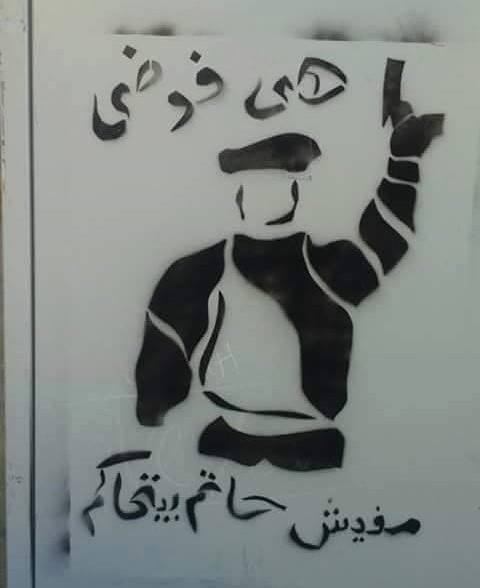Latest NEWS
- Aswat Masriya, the last word
- Roundup of Egypt's press headlines on March 15, 2017
- Roundup of Egypt's press headlines on March 14, 2017
- Former Egyptian President Hosni Mubarak to be released: lawyer
- Roundup of Egypt's press headlines on March 13, 2017
- Egypt's capital set to grow by half a million in 2017
- Egypt's wheat reserves to double with start of harvest -supply min
- Roundup of Egypt's press headlines on March 12, 2017
Civil society organisations document 625 torture cases from Jan. to Nov.

Graffiti featuring a police officer carrying a gun taken from a popular Egyptian movie "Chaos".
By Viola Fahmy
CAIRO, Dec. 10 (Aswat Masriya) - Civil society organizations documented 625 torture cases in Egyptian prisons, out of which 51 were cases of collective torture throughout the period between January and November 2015.
At a press conference in the Press Syndicate Thursday, organizations including the Egyptian Initiative for Personal Rights (EIPR), Egyptian Center for Economic and Social Rights (ECESR) and El Nadeem Center for Rehabilitation of Victims of Violence said that 37 people died as a result of torture while in custody throughout the past 11 months.
Member of El Nadeem Center Susan Fayad said that cases of "enforced disappearances" are estimated in hundreds throughout the past year as a result of what she described as "the poor political system" in Egypt.
Human rights lawyer, Mokhtar Mounir said that "violations are not individual cases" as a total of 125 cases of "enforced disappearance" took place in October and November, including 46 cases whose locations are still unknown.
President Abdel Fattah al-Sisi said earlier in December in a speech at the Police Academy in Cairo that the number of cases of police misconduct is small compared to the number of police stations nationwide.
He further described them as "individual cases", and that they do not represent the entire institution.
Mounir demanded the establishment of an independent committee tasked with receiving reports on enforced disappearances, on condition that it includes representatives from the Public Prosecutor's Office, the National Council for Human Rights, human rights organizations and families of those who disappeared.
The committee will be responsible for investigating the cases of enforced disappearances and the announcement of results to the public.
Head of the freedoms committee at the press sydnicate Khaled al-Balshi said that 32 journalists are in custody on different charges including 20 journalists arrested while doing their job. He stressed that the extension of pre-trial detention has become a "harsh detention tool."
Former Interim Preisdent Adly Mansour amended the provisions of the criminal code extending the lenghth of pre-trial detention. The amendment stipulates that the court of cassation or the court of referral to order pre-trial detention for 45 days, renewable without a time limit, on those sentenced to death or life imprisonment.
Balshi said that within a period of seven days the press syndicate documented 10 torture cases of journalists and the occurrence of 365 violations in six months. Balshi warned against the danger of what he called the "persistence" to reinforce the deteriorating conditions.
Rights lawyer Negad El-Borai reviewed the terms of a draft law preventing torture. The law includes a definition of the crime, limits the responsibility to detention centers, and intensifies the punishment against those who practice it.
El-Borai blamed the National Council for Human Rights for its lack of support for the issue of torture in detention center, stressing that the high rates of the phenomenon threaten "disaster".
The conference included testimonies by families of torture victims, where the sister of 28-year-old Abdul Samiee Mohamed said her brother was tortured for 14 days until he died in a police station where he was being held on accusations of stealing a mobile phone.
Several cases of alleged police torture were documented throughout November, including that of Talaat Shabib's, 47, who was arrested on November 24 at a cafe at 11 pm in the district of al-Amawya on suspicion of possessing Tramadol, a pain killer used ubiquitously as a recreational drug in Egypt.
Hours later, his family received information that Shabib died on his way to Luxor International Hospital, triggering protests in front of the police station against what they believe was the killing and torture of Shabib by police.
The forensics report revealed that the deceased suffered a blow on his neck and back which resulted in breaking the spinal cord and led to his death.
Nine policemen were referred to the criminal court for their involvement in Shabib's killing.
Egypt's constitution prohibits torture in all its forms and considers it "a crime that is not subject to prescription", as per article 52.
Article 55 stipulates that "every person who is either arrested, detained, or his freedom is restricted shall be treated in a manner that maintains his dignity. He/she may not be tortured, intimidated, coerced, or physically or morally harmed; and may not be seized or detained except in places designated for that purpose, which shall be adequate on human and health levels."
The article continued that violating any of the mentioned terms "is a crime punishable by law".










